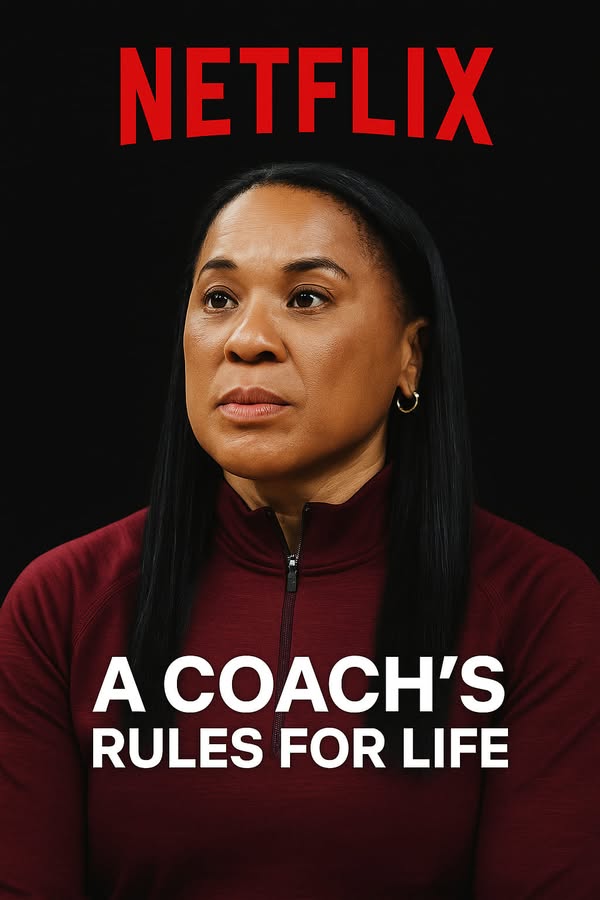In the ever-growing landscape of sports documentaries, Netflix has again struck gold with the release of The Playbook: Dawn Staley – A Coach’s Rules for Life. The series, which has previously profiled icons like Doc Rivers and José Mourinho, adds a deeply resonant and powerful chapter with Staley’s story—a narrative driven by grit, vision, heart, and above all, purpose.
Structured around her personal “rules for life,” the episode captures not only the essence of what makes Dawn Staley a coaching legend but also the profound humanity that defines her impact far beyond the basketball court. This isn’t just a tale about wins and losses. It’s about the making of a leader, the forging of character through adversity, and the ways in which sport can be a vessel for broader societal change.
Dawn Staley is no stranger to the spotlight. From her days as a Philly-bred point guard lighting up the court at the University of Virginia, to her decorated tenure as a WNBA star and Olympian, and now to her role as the head coach of the South Carolina Gamecocks women’s basketball team, Staley has always been more than just a name in the headlines. She’s been a movement unto herself—breaking barriers, challenging expectations, and redefining what leadership in sports can and should look like.
In the Netflix episode, viewers are brought into Staley’s world through a lens of honesty and introspection. Rather than crafting a surface-level celebration of her success, the episode zeroes in on the formative experiences that helped shape her coaching philosophy. Each “rule for life” she shares is steeped in personal history, earned wisdom, and an unrelenting belief in the power of discipline and integrity.
The first rule she introduces is simple yet powerful: Bring Your Own Ball. It’s a nod to her upbringing in North Philadelphia, where public courts were often occupied or unavailable, and if you didn’t bring your own ball, you didn’t play. But on a deeper level, it’s a metaphor for agency and self-determination. “No one’s going to hand you the opportunity,” Staley says with quiet conviction. “You’ve got to come ready. You’ve got to own your place in the game.”
This lesson reverberates throughout her life story. Raised in a neighborhood where resources were limited and dreams were often deferred, Staley found refuge and purpose in basketball. Her mother, Estelle, remains a towering presence in her life—tough, loving, and a staunch believer in the value of hard work. “My mom didn’t play,” Staley says, smiling. “She taught us you don’t ask for handouts. You go get it.”
Another of her guiding rules is Create a Home Court Advantage. For Staley, this isn’t just about winning at home—it’s about creating a culture where everyone feels seen, respected, and empowered. When she took over at South Carolina, she inherited a program in need of transformation. She brought not only a vision but an unshakable belief that culture precedes success. She wanted to build something that would last beyond her own tenure—a legacy of excellence rooted in authenticity and community.
She talks candidly about the early struggles, the moments when doubt crept in, and how she leaned on this rule to keep moving forward. It meant more than practice drills and strategy sessions; it meant investing in relationships, showing her players that she had their backs, and setting a tone of accountability and compassion.
Perhaps the most poignant rule she shares is Leave the Place Better Than You Found It. For Staley, coaching is not just about wins—it’s about stewardship. She sees herself as a caretaker of the game and a mentor for the next generation of leaders. This mindset is deeply reflected in her advocacy for gender equity, racial justice, and equal opportunities for women in sports. She doesn’t shy away from speaking truth to power, even when it’s uncomfortable or controversial.
The documentary features powerful footage of her navigating difficult moments, from confronting systemic issues within the NCAA to addressing public scrutiny. In every instance, Staley’s voice rings with purpose and poise. She understands the weight of her platform and uses it with precision. As one player puts it, “Coach doesn’t just talk about change—she lives it.”
We also see Staley’s rule Bet on Black take center stage. She speaks with unflinching pride about what it means to be a Black woman in a position of influence in a sport—and a society—that hasn’t always welcomed people who look like her into the highest ranks. “When you bet on Black, you bet on excellence. You bet on resilience. You bet on the unshakeable belief that we belong,” she says in one of the episode’s most powerful moments.
Throughout the episode, her connection with her players becomes a central theme. Staley doesn’t just coach basketball; she coaches life. Her mentorship extends off the court, into the classrooms, into living rooms, into hearts. She knows her players by name, by story, by dream. The trust she builds is not transactional—it’s transformational. The cameras capture moments of laughter, tears, tough conversations, and celebratory hugs that reveal the emotional intelligence and empathy at the core of her leadership.
Former players, current stars, fellow coaches, and sports commentators all contribute to the episode’s depth. They speak not just of Staley’s tactical brilliance, but of her unwavering moral compass. There’s a recurring sentiment that echoes throughout: when Dawn Staley walks into a room, the atmosphere changes. People sit up straighter. They listen more closely. She commands respect not by demanding it, but by living it.
In a particularly moving segment, Staley revisits her time as head coach of the USA Women’s Basketball team, where she led the squad to Olympic gold. Standing on the podium, she reflects not just on victory, but on the journey to get there. The sacrifices, the setbacks, the sleepless nights. And above all, the sense of responsibility to represent not just herself, but the countless others who paved the way for her.
The cinematography of the episode is intimate and reverent. Shots of Staley walking through the halls of Colonial Life Arena, mentoring young players during practice, and reflecting alone at home create a textured portrayal of a woman who balances strength and vulnerability in equal measure. The soundtrack is soulful and reflective, echoing the spirit of Staley’s hometown roots and her lifelong fight to be seen and heard on her own terms.
The final moments of the episode are especially moving. As she shares her last rule—Do What You Were Born to Do—Staley sits in quiet reflection. She speaks softly about purpose, about listening to that inner voice that drives you even when no one else understands. “You know when you’re doing what you’re born to do,” she says. “Because it fills you up and empties you out at the same time.”
As the screen fades to black, viewers are left not just with a deeper understanding of Staley’s career, but with a sense of renewed inspiration. Her rules are more than strategies for coaching—they are blueprints for life. They speak to anyone who has ever had to fight for their place, stand alone in a room, or carry the weight of expectation with grace and grit.
Netflix’s The Playbook: Dawn Staley – A Coach’s Rules for Life is not simply a profile of a basketball coach. It is an essential story of courage, conviction, and compassion. It is a masterclass in leadership. And above all, it is a tribute to a woman who has never just played the game—she’s redefined it.
In a world that often idolizes flash over substance, Staley’s episode is a refreshing reminder of what true greatness looks like. It’s not about the rings or the trophies, though she has plenty. It’s about the lives touched, the standards raised, and the doors opened for others to walk through. Dawn Staley’s rules for life are now out in the world for millions to see—and they just might change more than a few of them.



